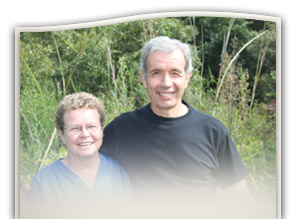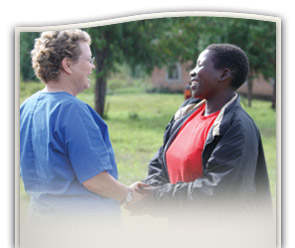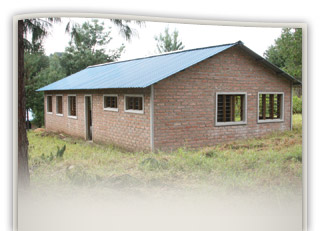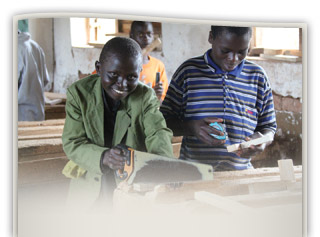
An organization is known by the actions of its members.
I met ASI member Janet Fournier, her husband, Frank, and adult son Jason for the first time in Kafue, Zambia, last March. We rented a well-used white Land Cruiser—still a common mode of transportation in Africa—and drove more than 1,000 miles across the plains of southern Africa. We passed endless high grasses, thatched huts, and villages where Coca Cola signs announce the presence of the developed world.
The road was paved, but increasingly rutted as we neared the Tanzania border, a bottleneck teeming with people and clogged with cars and trucks waiting to cross. Beyond the border, we dipped down into a valley on our way to the mountainous regions of Tanzania—past tea plantations and rocky formations that reminded me of my native Pacific Northwest.
We dropped Jason off at a gas station in Makambako, where his wife and three little girls anxiously waited to pick him up. Janet and Frank had brought Jason to Africa when he was 14, and he’d stayed on to become a mission pilot. He is now the executive secretary at Kibidula Farm, where he has served for more than 17 years.

Janet and Frank Fournier. Frank is president of Eden Valley Institute in Loveland, Colorado. They “commute” between Colorado and Tanzania.
After saying our hellos and goodbyes—Janet and Frank were happy to see their bubbly granddaughters for the first time in many months—we traveled on. Janet seemed to brighten as we got closer to “her village.” It was the rainy season, and Janet was afraid the road might be impassable, so we stopped for the night in a busy town. Janet led us to her favorite backstreet restaurant where we had a delicious vegetarian meal, despite the fact that the power had been out for an indefinite period.
We set out early the next morning, and for a very good reason. It took us nearly four hours to travel the final 50 miles. The road wasn’t impassable, but it might as well have been. We traveled over one pass where the mud ruts were two to three feet deep in places—going downhill. The Land Cruiser was no longer white, and I wondered if we’d ever get out again. Janet and Frank simply laughed.
The mountain views were breathtakingly beautiful, and I took more pictures than I needed to as I mulled over the many questions I wanted to ask Janet when we arrived at our destination. We passed through a village called Mago in the Makete District, one of seven districts in Tanzania’s Iringa Region. It borders the Mbeya Region to the north and west, the Njombe District to the east, and the Ludewa District to the south. Those names meant nothing to me until I stood in that village and realized that everything I’d read about Africa had failed to describe the reality of it.
We stopped in Lupalilo village to pick up some rice and a few other essentials. Schoolchildren in bright blue and green uniforms jogged past on the muddy road below. Some came running from the school next door, and we examined each other with equal measures of curiosity. I took pictures of their smiling faces, and they crowded close to see their digital images on my camera’s tiny screen.
“These are my children!” Janet shouted above the fray, grinning like she’d finally come home. Already, some of my questions were finding answers, such as Why did Janet come here? and Why has she stayed so long?
I began to wonder how I would ever want to leave, knowing I might never come again to this place. I had four children of my own waiting at home in the United States. Wild thoughts began stirring: Why don’t I just go home, get my family, and we’ll all come back and live here in this beautiful place with all these beautiful children!
It could happen.
Not far from the village and down a dirt lane, we came to “Janet’s place.” That’s what most people call it, even though it has a more formal name: Eden Valley Foster Care Mission. There we wandered around Janet’s sprawling property, with its weeping pine trees, natural spring, rushing stream, and waterfall. Finally, we sat down in front of Janet’s house, and she told me her story with the same pleasure a grandmother finds in talking about the good old days.

Janet Fournier greets one of her Bible workers upon returning to Eden Valley Foster Care Mission.
“In 2003 I heard about this place,” she said. “It was the village of Mzee Sanga, an old patriarch of Kibidula Farm. He coaxed me many times to come out and visit this village, because it was the village where he was born, and his family and relatives lived here. He had a burden on his heart for his family to get to know Jesus, and so he asked us to come out here, and we finally did. And then he showed us the needs of all the orphans.”
There are more than 28,000 orphans in the Makete District alone, which has a population of about 128,500. More than 50 percent of the children in the Makete District schools are orphans. Most of them live with grandmothers, aunts, or uncles.
“So we came out and saw the need, and the need pulled at our hearts, and we decided to come out and do something,” Janet continued.
It was a classic statement that echoed what I’ve heard from hundreds of ASI members I’ve talked to in the past year: I saw a need; it pulled at my heart; I decided to do something about it. ASI members are known for their humanitarian spirit. It’s one of their most endearing—and enduring—qualities.
“We came out with just a few bales of clothes,” Janet said. “We started distributing them and singing songs with the kids in the school. Soon Baraza, who is now one of my Bible workers, came along and helped me as a translator. We would just go from house to house in the village and pray with the people if they were sick. I had some medicines, and I started pulling teeth and helping the people with their simple needs. The Lord trained me. We had previously worked in Lesotho, and Dr. Lukens (now at Weimar) taught me how to suture wounds and do dental extractions. The first time I delivered a baby was with a book: I was sitting there looking at the book, and the baby’s coming, and I’m thinking, OK, now what do I do? But the Lord blessed, and now there are facilities where people can deliver babies. Wound care and dental care I do here.”
It was another familiar refrain. Most ASI members I’ve talked to didn’t start out with grand visions for outreach or service. Many initially had other plans for their lives. But at some point, the Lord placed in their path a need, planted in their hearts an urgent sense of compassion, and called them to do something about it. As a result, they became missionaries—at times reluctant ones. Some serve in regions such as Africa or South America, and some serve in their hometowns and places of business. Some start schools and clinics, and some just keep doing what they’re doing, but with sanctified vision.

Eden Valley Foster Care Mission's new cafeteria, built from a One-Day Church structure
“From there the vision grew,” Janet went on. “For the orphans, we started with one village, and then two and then three. And now we serve more than 800 children in seven villages. At first I thought we’d start an orphanage, but as so many children came into the picture, we found we couldn’t help that many kids in an orphanage. So we had to figure out a way to help them in a better situation.”
Complicated circumstances make you think. Sometimes they require you to come up with creative solutions that take on a life of their own. Events rarely conform to your best-laid plans.
“We decided we would help the kids in their homes,” said Janet. “We wouldn’t take the kids from their grandmothers or their families, but we would just facilitate the families to keep their kids. Their greatest need wasn’t food. Their greatest need was clothing. They wore rags. They were dirty. They were filthy. So we tried to help them by providing these things. We bought them salt and soap and school uniforms, and clothing. Then we began to see that there was a greater need.”
Responding to a need sometimes takes you places you never planned to go. Every ASI member has a story to tell, and most will say it was easy to respond initially to a simple need. But at some point their faith was sorely tested when they came face-to-face with needs that seemed more like bottomless pits.
Janet’s friends say she is courageous and pragmatic. If she has ever balked at the Lord’s calling, she has never shown it. But she herself will tell you that it hasn’t been a smooth road. She has witnessed heartbreaking circumstances that only strengthened her resolve.
“These young girls were leaving the villages,” she recalls. “They were going out into the big cities, getting pregnant, getting HIV, and coming home with a baby—another one for the grandmother to care for. And boys, they would come home terribly sick, and then they would die. They used to blow a trumpet when somebody died in the village, and that trumpet used to blow almost daily.”

Students at the Eden Valley Foster Care Mission carpentry school, held at the local school in Mago village
No trumpets blew while I was visiting Mago village. New medicines prolong the existence of HIV/AIDS sufferers, but that doesn’t make their lives easy. They must find a way to make a living.
“I saw that we needed to do something for these young people,” said Janet, “so that when they were finished with school, they would have some way to support their families other than being at the end of a garden hoe all day. So we decided to start a sewing and carpentry school for the youth. The local school was generous enough to give us two classrooms where we started a carpentry school and a nursery school for the little ones. We rented another building and started our sewing school. We started with just maybe 6 sewing machines and kept adding until we had 7, then 10, then 12, then 15 or so sewing machines. But it seemed that maybe we were teaching them too little, and so the vision grew. There was still something lacking, and more was needed.”
Soon the villages were vying for where Janet would live. She was given a large piece of prime property overlooking the valley, and she recently received an imposing container from ASI with 37 One-Day Church structure kits in it. She now has a house and a little church with a baptismal tank. A four-classroom block, a carpentry and mechanic shop, and a cafeteria are in place. Soon she will begin accepting students for yearlong courses in mechanics and advanced tailoring. She has a full-time assistant and three Bible workers who share her vision and her smile.
That’s another ASI member hallmark. As their visions for service grow, they find ways to collaborate with and support each other and the church at large. Each one brings different strengths to the table—unique talents, knowledge, and spiritual gifts. Their ministries extend and complement the overall mission of the Adventist Church. They rarely work alone.
Later that day, we returned to the village school. Janet’s children began pouring through the doors and following us around the grounds in a happy entourage. At one point, five little hands gripped one of mine. It is my favorite memory of Africa. They all wanted to be touched, and they all wanted to look me squarely in the face. I ignored their runny noses and muddy hands. They were Janet’s children. They were my children. They were the Lord’s children.
________
Conna Bond is communication director for ASI. She interviewed Janet Fournier at Eden Valley Foster Care Mission for an upcoming episode of ASI Video Magazine, which airs on Hope Channel and 3ABN. Visit www.asiministries.org to view prior episodes of ASI Video Magazine. This article was published August 12, 2010.